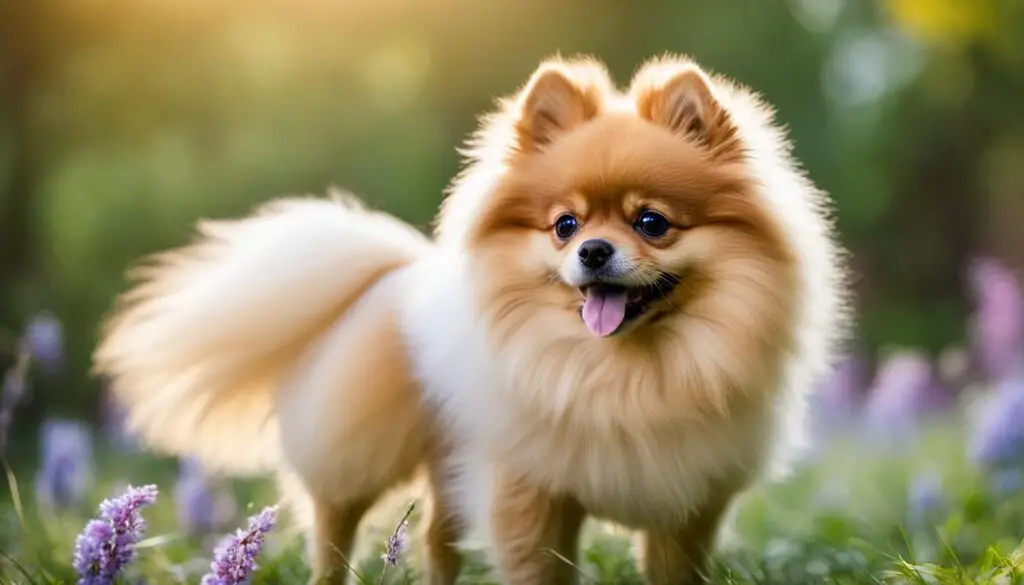Pomeranian dogs are known for their small stature, but don’t let their size deceive you. These charming toy dogs have personalities as big as their hearts. In this section, we will explore the fascinating world of Pomeranian temperament, characteristics, and behavior traits, shedding light on what sets them apart from other breeds.
Pomeranians are true companions, standing at a height of eight to 11 inches and weighing a mere three to seven pounds. With their perky ears and medium-length coats that come in various colors and patterns, they certainly catch the eye. But what truly makes Pomeranians special are their lively and friendly personalities.
Despite their small size, Pomeranians have an undeniable confidence and fearlessness. They often approach larger dogs with no hesitation, oblivious to their own stature. Their active and intelligent nature makes them excellent contenders in obedience competitions, although their independent streak might shine through. Pomeranians also excel at being alert and alarm dogs, always ready to protect their loved ones.
These delightful dogs have a natural affinity for children, but it’s crucial to handle them with care due to their delicate size. Now, let’s delve deeper into the distinct personality traits that make each Pomeranian truly unique.
Key Takeaways:
- Pomeranians are small in size but big in personality.
- They have perky ears and medium-length coats in various colors and patterns.
- Pomeranians are confident, fearless, and not afraid to approach larger dogs.
- They excel in obedience competitions despite their independent streak.
- Pomeranians make excellent alert and alarm dogs.
- Caution should be exercised when interacting with Pomeranians around children due to their small size.
Pomeranian Personality Traits
Each Pomeranian has its own unique personality, but there are some common traits seen in the breed. Pomeranians are playful, energetic, loyal, loving, lively, outgoing, and quite intelligent. They tend to mirror the behavior of their owners and are adaptable to different environments. Pomeranians have a strong instinct to protect and guard their owners, making them good watchdogs. They form close bonds with their family members and can get along well with other dogs and even cats. It’s important to properly socialize Pomeranians from a young age to ensure they develop good behavior traits.
One of the distinctive traits of Pomeranians is their individuality. Despite their small size, Pomeranians are known for their big personalities. They have a confident and fearless nature, often not realizing their own limitations. This can sometimes lead to them taking on larger dogs or behaving assertively. Pomeranians are also known for their enthusiasm and zest for life. They are always ready for an adventure and thrive in an environment where they receive plenty of mental and physical stimulation. Their intelligence allows them to learn quickly and engage in various activities.
However, Pomeranians may also have some quirks in their personalities. Some Pomeranians can be stubborn or bossy, requiring consistent and firm training to establish boundaries and prevent behavioral issues. Additionally, Pomeranians may have a tendency to become overprotective or develop separation anxiety if not properly socialized and trained. It’s important for owners to provide them with a structured routine, positive reinforcement training, and plenty of social interaction to ensure they grow into well-rounded and well-behaved companions.
Pomeranian Personality Quirks
Here are some common personality quirks observed in Pomeranians:
- Alertness: Pomeranians are naturally alert and have a keen sense of awareness, making them great watchdogs.
- Barking: Pomeranians have a tendency to be vocal and may bark excessively, which should be addressed through proper training.
- Need for Attention: Pomeranians thrive on attention and may exhibit attention-seeking behaviors if not given enough mental and physical stimulation.
- Playfulness: Pomeranians have a playful nature and enjoy interactive games and toys.
- Curiosity: Pomeranians are curious by nature and may investigate their surroundings with enthusiasm.
Understanding and appreciating the unique personalities and quirks of Pomeranians can help owners provide them with the proper care, training, and socialization they need to thrive and be happy companions.
| Personality Traits | Description |
|---|---|
| Playfulness | Pomeranians have a playful nature and enjoy interactive games and toys. |
| Alertness | Pomeranians are naturally alert and have a keen sense of awareness, making them great watchdogs. |
| Curiosity | Pomeranians are curious by nature and may investigate their surroundings with enthusiasm. |
| Need for Attention | Pomeranians thrive on attention and may exhibit attention-seeking behaviors if not given enough mental and physical stimulation. |
| Loyalty | Pomeranians form strong bonds with their owners and are fiercely loyal to their family. |
Pomeranian Care and Behavior Issues
Proper care and addressing behavioral issues are essential for ensuring the well-being of your Pomeranian. In this section, we will discuss the grooming needs, social needs, and common behavior issues that Pomeranians may experience.
Grooming Needs
Pomeranians have moderate grooming needs, requiring regular attention to keep their coat healthy and beautiful. Their double coat consists of a dense undercoat and a longer outer coat, which requires regular brushing to prevent matting and tangling. Plan for once or twice weekly grooming sessions, with daily brushing during shedding seasons to minimize loose hair around your home. Regular grooming not only keeps your Pomeranian looking their best but also helps promote good skin and coat health.
Social Needs
Pomeranians are social dogs and enjoy the company of their human family members. They thrive on attention and affection and form strong bonds with their owners. It is important to provide regular socialization opportunities for your Pomeranian from an early age. This includes exposing them to different environments, people, and other animals. Socialization helps to prevent behavioral issues such as shyness, fearfulness, and aggression. Additionally, Pomeranians benefit from engaging in regular exercise and playtime to keep them mentally and physically stimulated.
Behavior Issues
While Pomeranians are generally well-behaved, they can develop certain behavior issues that require attention and training. One common issue is excessive barking, which can be triggered by boredom, anxiety, or territorial instincts. Consistent training and providing mental stimulation can help address this behavior. Pomeranians are also prone to separation anxiety and may experience distress when left alone for extended periods. Gradual desensitization and counterconditioning techniques can be effective in managing separation anxiety.
In some cases, Pomeranians may exhibit behavior issues such as eating poop, sleeping issues, and teething and chewing problems. These issues can often be addressed through proper training and providing appropriate chew toys and outlets for their natural behaviors. It is important to consult with a veterinarian or professional dog trainer to address specific behavior issues and develop a tailored plan to correct them.
| Grooming Needs | Social Needs | Behavior Issues |
|---|---|---|
| Pomeranians require regular brushing to prevent matting and tangling of their double coat. | Pomeranians thrive on attention and affection, and benefit from socialization and regular exercise. | Common behavior issues include excessive barking, separation anxiety, eating poop, and teething and chewing problems. |
| Regular grooming promotes good skin and coat health. | Early socialization prevents shyness, fearfulness, and aggression. | Training and providing appropriate outlets can address behavior issues. |
Conclusion
After exploring the unique personalities of Pomeranians, it’s clear that these charming dogs have a lot to offer as companions. Pomeranians are perky, energetic, and extremely loyal. They have a natural instinct to protect their owners, making them excellent watchdogs.
To ensure the well-being of a Pomeranian, proper socialization, training, and exercise are key. These intelligent dogs thrive when they are given opportunities to learn and engage with their environment. By providing mental stimulation and a structured routine, owners can help prevent behavior issues such as excessive barking or separation anxiety.
In summary, Pomeranians are delightful pets for the right owner who appreciates their unique personalities. With their playful and loving nature, they form close bonds with their family members and can get along well with other pets. Remember, Pomeranians require regular grooming attention, and their small size means they should be handled with care.
In conclusion, the key takeaways are that Pomeranians are perky, intelligent, and loyal dogs that bring joy to their owners’ lives. With the right care and attention, they can thrive in any environment. If you’re looking for a small companion with a big personality, a Pomeranian might be the perfect fit for you!
FAQ
What is the ideal height and weight of a Pomeranian?
Pomeranians have an ideal height of eight to 11 inches and weight of three to seven pounds.
What are the common traits seen in Pomeranians?
Pomeranians are playful, energetic, loyal, loving, lively, outgoing, and quite intelligent.
Are Pomeranians good with other dogs and cats?
Pomeranians can get along well with other dogs and even cats, with proper socialization.
How often do Pomeranians need to be groomed?
Pomeranians require regular grooming attention once or twice weekly, with daily sessions during shedding season.
Do Pomeranians have any behavior issues?
Some Pomeranians may exhibit behavior issues such as excessive barking, separation anxiety, eating poop, sleeping issues, teething, and chewing issues.
How can I address and prevent behavior issues in Pomeranians?
Proper training, socialization, and mental stimulation are important for addressing and preventing behavior issues in Pomeranians.






No Comments